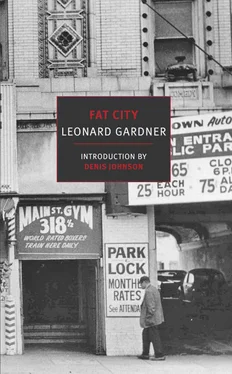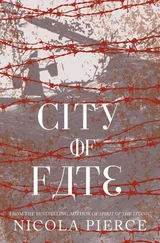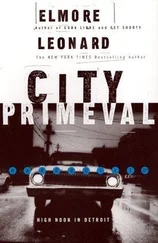Leonard Gardner - Fat City
Здесь есть возможность читать онлайн «Leonard Gardner - Fat City» весь текст электронной книги совершенно бесплатно (целиком полную версию без сокращений). В некоторых случаях можно слушать аудио, скачать через торрент в формате fb2 и присутствует краткое содержание. Год выпуска: 2015, Издательство: NYRB Classics, Жанр: Современная проза, на английском языке. Описание произведения, (предисловие) а так же отзывы посетителей доступны на портале библиотеки ЛибКат.
- Название:Fat City
- Автор:
- Издательство:NYRB Classics
- Жанр:
- Год:2015
- ISBN:нет данных
- Рейтинг книги:5 / 5. Голосов: 1
-
Избранное:Добавить в избранное
- Отзывы:
-
Ваша оценка:
- 100
- 1
- 2
- 3
- 4
- 5
Fat City: краткое содержание, описание и аннотация
Предлагаем к чтению аннотацию, описание, краткое содержание или предисловие (зависит от того, что написал сам автор книги «Fat City»). Если вы не нашли необходимую информацию о книге — напишите в комментариях, мы постараемся отыскать её.
Fat City — читать онлайн бесплатно полную книгу (весь текст) целиком
Ниже представлен текст книги, разбитый по страницам. Система сохранения места последней прочитанной страницы, позволяет с удобством читать онлайн бесплатно книгу «Fat City», без необходимости каждый раз заново искать на чём Вы остановились. Поставьте закладку, и сможете в любой момент перейти на страницу, на которой закончили чтение.
Интервал:
Закладка:
“Just pissed off,” said Buford.
“You dropped your left. Don’t sweat over it. You’ll get him again. They’ll have you back and you’ll knock him out next time. He don’t have what he use to have. Ernie, you’ll get that nose set as good as new, don’t worry about it. Look at mine. Would you believe mine was ever busted?”
“Yeah.”
“I don’t know what kind of deal we were getting there tonight, but I never seen anything like it. Stopping that fight when Ernie had the guy beat. You saw it, Babe. That kid should of been disqualified. Wes wasn’t hurt either. Anybody can get tagged the first round. You take a good punch like Wes does, it don’t mean a thing. And Bobby, he won every round.”
“He did,” Babe agreed. “That’s a fact. That was robbery if I ever seen it. You were hurting that boy.”
“What difference it make?” Scowling, his broad, tan face unmarked, Bobby Burgos took a drink from his bottle of beer.
If you guys was any kind of trainers, look like one of us ought to won, thought Wes.
Babe called in vain for the waitress, his voice failing under the exertion, his cries like the desperate nasal mumbling of a mute. Ruben turned, said “Hey,” and she approached.
“Sweetheart, give us some more beer, and some pop for these boys.”
“I want a beer, too,” said Wes, sulking. “I don’t want no pop . Want a Lucky Lager. I’m twenty-two.”
“I can’t help it. If you had an ID I’d serve you.”
“Left it home.” Wrinkling his forehead, Wes, seventeen, looked her in the face as if to invite closer scrutiny.
“This one’s all right,” she said to Ruben, nodding toward Bobby Burgos. “It’s just these three.”
“We been through all this,” said Ruben. “Forget it. Pop’s better for them anyway. Wes, sure you don’t want another one? Bring him another pop. These boys fought their hearts out tonight over at the Del Monte Gardens.”
“What are they, boxers?”
“These boys are the top amateurs in the Valley. We come all the way up from Stockton. You like fights? Come with us sometime. I’ll get you in free.”
“She’s married,” said Babe, drawing on a thin cigar.
“How do you know?”
“Ring.”
“That’s all right. Your husband wouldn’t mind if you went to the fights one night, would he?”
She laughed evasively, and as she walked away with the empty bottles, Ruben said: “Nice ass.”
“How old you think she is?” asked Wes.
“She’s old enough. She’s old enough.”
“Shit. I wish I could get her out in the car,” said Wes. “I’d fuck her to death.”
Wes Haynes had drunk four bottles of soda by the time they went out. They drove along the highway until a neon cocktail glass appeared in the darkness. By then Buford was asleep. Wes remained with him in the car. When the others finally came out of the bar, Ruben got in back, and the motor droned on into the night. Jolted awake, the car momentarily off onto the shoulder then swerving back onto the pavement, Wes saw flat misty fields, fences, barns, the dark contours of distant hills. Waking again to the faint sound of music, the motor silent, only Babe and Bobby gone from the car, the others sleeping, Wes saw a low building in the fog with Regal Pale glowing in blue neon in a window and was overcome with dejection. He had made no secret of his training. Acquaintances at school spoke to him as though they believed he was a professional, and he had not cared to correct them. He had believed he would be one soon enough — because it had seemed the natural and inevitable thing for so many years, because against all contrary evidence, and simply because he was himself, he felt he could never be dominated. Now he felt he should have known all along that he was nothing. Boxers were men in other towns, in big cities far from this car parked in the darkness alongside the highway between fields of vegetables. Resting his cheek against the cold window, he thought of killing himself, but years ago, standing beside his father’s legs in a crowd on a night sidewalk, he had seen a dead man profiled in a puddle of blood, his eye dumfounded, and Wes knew that if he was going to be killed he was not going to do it himself. They would have to come and get him and he would club them and choke them and shoot them and then he would run.
The voice of Bobby Burgos approached as if arguing with itself. Not until the voice reached the car did Wes hear Babe’s hoarse replies. “I’ll whip your ass. I’m not going to let you behind that wheel. I’ll take you on right now. Put up your hands. Don’t you believe me? I’m not going to let you behind that wheel. It’s Ruben’s car, I can’t be responsible for letting you behind that wheel. I’m sorry, old buddy, but that’s the way it is.” The interior light came on and as Babe crawled in, Burgos gave him a shove that sent him across the seat and against Ernie Munger, who sat suddenly upright.
“Don’t get smart,” warned Babe.
“Just shut up.” The door slammed. In a moment the engine started.
“Don’t drive too fast, Burgos. I’ll nail you one.”
“Man, I’m not going to drive fast. You’re the one was driving too fast.”
“I wasn’t driving fast.”
“Hundred’s pretty fast.”
“I wasn’t going a hundred.”
“You were all over the road. You’re drunk as a pig.”
“What? What am I? What did you say to me?” asked Babe. And they were off again down the highway, Buford’s small lax body vibrating against Wes in the drone of the motor that for moments faded to silence as if the car were still back in the parking area outside the bar with the blue neon sign.
Wes awoke on a street of small frame houses. The driver’s seat was empty. All was silent except for the snores and snuffles of damaged noses. Shivering from the cold, his mind stark and confused, Wes got out to look up and down the wet street for Bobby Burgos. There was nowhere he could have gone, no bar or café or gas station, not even a lighted porch. Wes found himself at the corner looking down another street just as deserted. He looked back at the car; there was no one in sight anywhere. Burgos had vanished. A heavy mist was falling, making a nimbus around each streetlight. His face wet, his straightened hair standing upright from moisture and sleep, Wes looked up at the low, drizzling sky. Where he was he had no idea, but it was a town he had never seen before. He returned to the car and waited behind the steering wheel for Burgos.
“Bobby gone,” he said aloud. “Where’s Bobby?” But no one in the car answered and the sound of his voice made him uneasy. Finally he started the motor, thinking the sound might summon Burgos from wherever he was, but the idling motor seemed to make the car the focus of all the stillness of the street. He did not honk the horn. He put the car into gear and drove off. Afraid he might be unable to find the place again where Burgos had vanished, Wes looked at the names on the street signs. Before long he began to notice a familiar sequence. Driving slowly on, he waited to see if the name of his own street would come up in its proper order as had the names of the others; and seeing it, he turned mechanically, continuing along with that same suspension of thought until he was parked before his own house, the simulated tan bricks of its asphalt siding already faintly discernible.
“Buford, we home.” Leaning over the seat, he shook the thin leg.
“Uh.”
“We in Stockton. You want to drive the rest of the way? I’m going to bed.”
“Don’t know how.”
“Ruben? Ruben, hey, wake up, we home. Ruben?”
“Okay.”
“You awake?”
“Oh, yeah, everything’s fine.”
“I leave it to you then.” Wearing his hat and carrying his bag, Wes went around the house to the back door. He felt his way to his room, undressed to the sound of his brothers’ even breathing, got into bed and lay waiting. He heard nothing. Soon he rose and tiptoed to the front room, where he looked out the window and saw the car still there, clear in the first light of dawn that filled him with all the desolate reality of defeat. Quietly, in dread of waking his family, Wes crept back to his bed.
Читать дальшеИнтервал:
Закладка:
Похожие книги на «Fat City»
Представляем Вашему вниманию похожие книги на «Fat City» списком для выбора. Мы отобрали схожую по названию и смыслу литературу в надежде предоставить читателям больше вариантов отыскать новые, интересные, ещё непрочитанные произведения.
Обсуждение, отзывы о книге «Fat City» и просто собственные мнения читателей. Оставьте ваши комментарии, напишите, что Вы думаете о произведении, его смысле или главных героях. Укажите что конкретно понравилось, а что нет, и почему Вы так считаете.












